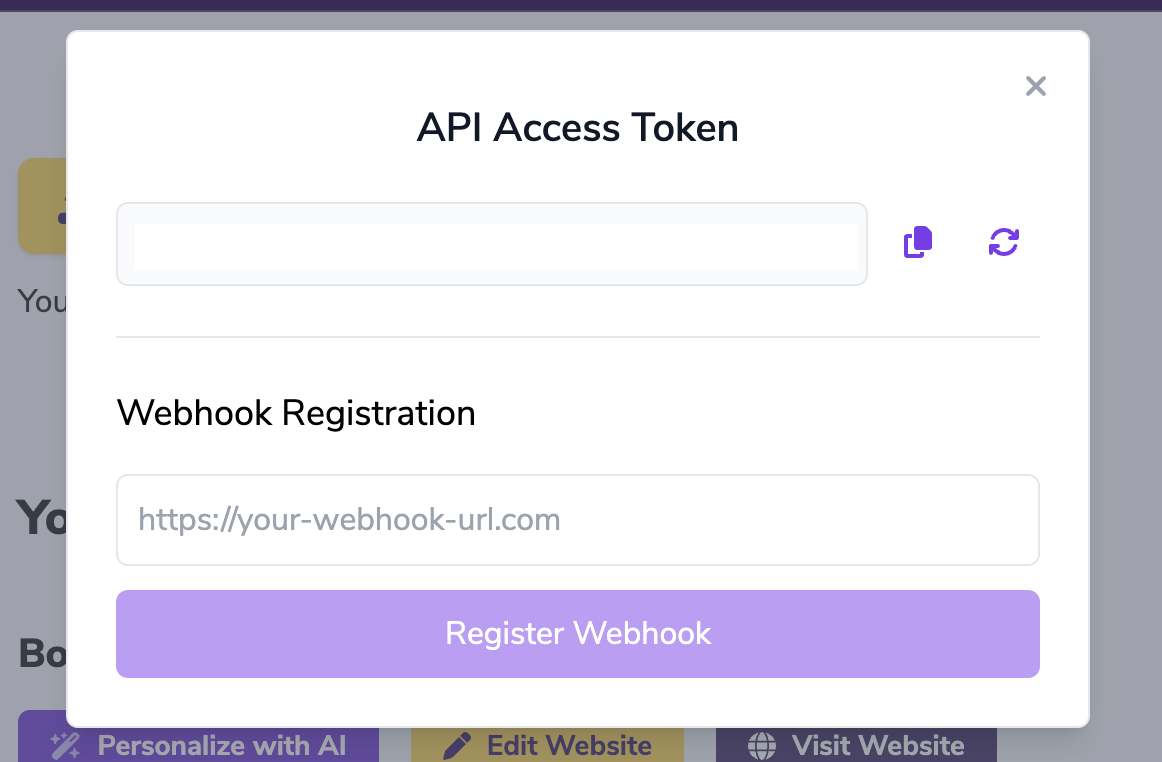BLOG ARTICLE
Podsqueeze API Documentation
Last updated: 2/26/2026
Last updated: 2/26/2026
Podsqueeze API Documentation
Introduction
The Podsqueeze API allows users to process and transcribe podcast episodes, retrieve job statuses, manage API tokens, and register webhook notifications.
Base URL
https://europe-central2-wannabe-entrepreneur.cloudfunctions.net/podsqueeze-api
1. Get a New Token
To get a token, the user needs a Podsqueeze account. Then, they can simply go to the dashboard, click on API Access in the sidebar, and a token will be generated.

2. Start a Podsqueeze Job
Uploads an audio or video file, stores it in Firebase, and starts a transcription job. You can provide either a base64-encoded file or a public URL to the episode.
Request
POST /
Authorization: Bearer <API_TOKEN>
Content-Type: application/json
{
"mode": "process_episode",
"podcastId": "<PODCAST_ID>",
"language": "en",
"file": "<Base64_encoded_audio/video_file>",
"episodeUrl": "<PUBLIC_URL_TO_EPISODE>",
"podcastTitle": "<PODCAST_TITLE>", [OPTIONAL]
"podcastDescription": "<DESCRIPTION>", [OPTIONAL]
"podcastImage": "<PODCAST_IMAGE_URL>", [OPTIONAL]
"episodeTitle": "<EPISODE_TITLE>", [OPTIONAL]
"episodeImg": "<EPISODE_IMAGE_URL>" [OPTIONAL]
}
Note: The episodeUrl must be publicly accessible and downloadable. Private or authentication-protected URLs are not supported.
Response
202 Accepted
{
"episodeId": "<EPISODE_ID>",
"status": "transcribing",
"estimatedTime": "60-120 seconds"
}
3. Get Job Status
Checks the transcription progress and results.
Request
POST /
Authorization: Bearer <API_TOKEN>
Content-Type: application/json
{
"mode": "get_job_status",
"episodeId": "<EPISODE_ID>",
"podcastId": "<PODCAST_ID>"
}
Response
200 OK
{
"status": "completed",
"transcript": "...",
"srt": "...",
"speakers": { ... }
}
4. Get Job Assets
Fetches transcription and other generated episode assets.
You can optionally request only specific assets using the assets parameter. This can be a comma-separated string or an array of keys. If omitted, all assets are returned for backwards compatibility.
Request
POST /
Authorization: Bearer <API_TOKEN>
Content-Type: application/json
{
"mode": "get_episode_assets",
"episodeId": "<EPISODE_ID>",
"podcastId": "<PODCAST_ID>",
"assets": "customContent,titles,tweets" // optional: comma-separated string
}
Or as an array:
POST /
Authorization: Bearer <API_TOKEN>
Content-Type: application/json
{
"mode": "get_episode_assets",
"episodeId": "<EPISODE_ID>",
"podcastId": "<PODCAST_ID>",
"assets": ["customContent", "titles", "tweets"]
}
Response
200 OK
{
"episodeTitle: "...",
"episodeCreationDate": "...",
"transcript": "...",
"srt": "...",
"timestamps": "...",
"quotes": "...",
"keywords": "...",
"bulletPoints": "...",
"longPost": "...",
"mentions": "...",
"newsletter": "...",
"shortPost": "...",
"titles": "...",
"tweets": "...",
"customContent": {
"<yourCustomKey1>": "...",
"<yourCustomKey2>": "..."
}
}
When assets is provided, only the requested keys are returned. Supported keys include: episodeTitle, episodeCreationDate, transcript, srt, timestamps, quotes, keywords, bulletPoints, longPost, mentions, newsletter, shortPost, titles, tweets, and customContent.
5. Get All Episodes IDs
Returns a list of all episodes for the authenticated user (as determined by the API token). Optionally, you can filter episodes by creation date using a timestamp.
Request
POST /
Authorization: Bearer <API_TOKEN>
Content-Type: application/json
{
"mode": "get_all_episodes_ids",
"timestamp": "2024-06-01 00:00:00" // optional, return only episodes created after this date
}
- The
timestampcan be an ISO string (e.g., "2024-06-01 00:00:00") or epoch seconds. - The user is determined from the API token; you cannot specify another user.
Response
200 OK
[
{"episodeId": "abc123", "podcastId": "pod789", "creationDate": "2024-06-01 12:34:56"},
{"episodeId": "def456", "podcastId": "pod789", "creationDate": "2024-06-02 09:10:11"}
]
Error Handling
All responses follow this format for errors:
{
"error": "Error message"
}
Contact & Support
For questions or issues, contact support@podsqueeze.com.
Repurpose your podcast content with AI